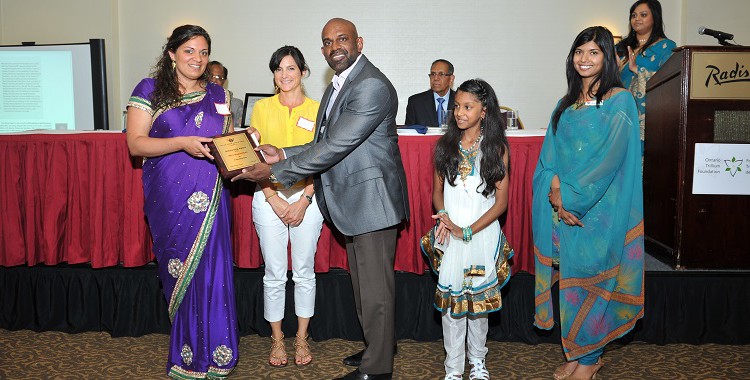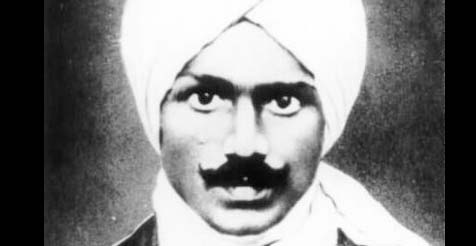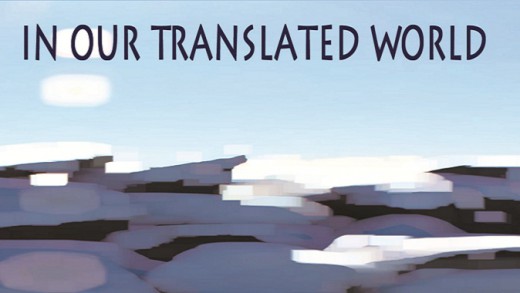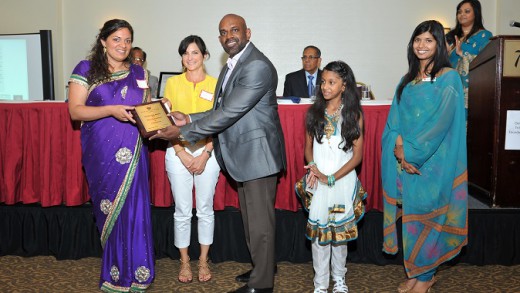Editor’s note: Recently we announced the Tamil Literary Garden’s 2014 essay competition, inviting undergraduates and graduate students to submit an essay on the topic: “New Technologies: Refashioning a Tamil Identity.” Today we have the pleasure of sharing excerpts from the winning essay of the 2013 competition.
“Defining common grounds
There are some cultural features which are mentioned repetitively when the question of a common Tamil identity arises which could serve as common ground for the Tamil community in Canada. Taking part in Tamil culture, one might suggest, is an essential feature to pass as Tamil. An authentic Tamil has to have access to Tamil literature and music, one of the oldest pieces of art in the world. However, if being a proper Tamil implies having a deep understanding for Tamil high culture, does that mean that only those Tamils are proper Tamils who hold a degree in Tamil studies since they are the ones who really have got a deep understanding for Tamil culture? Moreover, we are familiar with the struggle of second generation Canadian Tamils with Tamil language. Should we exclude those who cannot read and write in Tamil or should we draw the line between those Tamils who speak fluently and those who do not? (And what if a white person wrote and spoke Tamil fluently; does that make him/her a Tamil?). Disregarding the fact that the line would have to be drawn arbitrarily, do we really want to exclude thousands of young Tamils who might be identifying with Tamil culture but do not speak Tamil fluently? And would the preference of older members of the Tamil community in Canada who have been educated in Sri Lanka, over broad numbers of young Canadian Tamils not mean we have failed translating the Tamil past into Canadian presents? There must be more to it.
We could broaden our understanding of culture, from high culture (literature, dance, music) to every-day culture (customs, traditions). We could define that only those Tamils who are able to cook Tamil food are real Tamils. Being able to prepare a good Tamil dish and having the family gathered around the table to eat might make up the core of Tamil every-day culture. But then again, how many Tamil men are able to cook a tasty dish of puttu together with several curries? Does that make half of the Canadian Tamil community less of a Tamil? Furthermore, we could determine that only those Tamils who live in arranged marriages, are real Tamils. Arranged marriage, one could argue, is an important institution in Tamil culture which determines the values parents teach their children and which shapes every-day lives of Tamil families in contrast to other “western” lifestyles. Nevertheless, as Renuka Kumarasamy uncovers by referring to A. K. Ramanujan’s English translation of Kuruntokai, an anthology of Tamil Love lyrics recorded during the first three centuries A.D, we find that Tamil poets of the Sangam Period have glorified romantic love way before the idea of love marriages has been established in Europe after the 12th century. Thus, the analysis undertaken by Kumarasamy displays that the institution of arranged marriage in contrast to romantic love has not at all times been a core feature of Tamil culture. Which brings up the question why it should be today.
Now that we have considered different features which could be regarded as common ground for constructing a Tamil community in Canada – participation in Tamil high culture, language, food, marriage customs – we are left with the problem that either, we would have to exclude too many people who regard themselves as Tamils or who any other Tamil would spontaneously identify as Tamil, or that those features themselves turn out to not be really Tamil in the first place. At this point, the endeavour of constructing a Tamil community in Canada based on one shared Tamil identity might result in the conclusion that there is no such thing as a Tamil essence.”
“Does this mean we are not Tamils? Who am I then?
The question ‘Who am I?’ leads us straight to modern subject philosophy. By stating, “cogito, ergo sum”- I think, therefore I am – René Descartes (1641) introduced the subject of modernity into philosophy. Before Descartes, the individual was thought of as inseparable from its society, a mere product of its inner and outer nature. In contrast, the modern subject is characterized by autonomy, a “free reasoning subject“ which is capable of cognition and thus, controlling its inner nature, together with its ability for rational, purposeful agency, hence, controlling is outer nature. It was this paradigm shift introduced by modern subject philosophy in 17th century Europe which spread the idea of the subject separated from its society, the idea that every individual has got a core inner essence, irrespective of society’s influence.
More than 300 years later, this dominant idea of European enlightenment was questioned by Michel Foucault. Instead of asking ‘who am I?’, he asked ‘how do we come to identify with what we think we are?’. Obviously, his approach to subject philosophy does not take up on the Cartesian idea of an essentialist ‘I’. Furthermore, he brings back society into the picture by emphasizing the ‘we’. In doing so, Foucault introduced the term “discourse” into the philosophical debate in order to describe specific historical formations of power and knowledge. These formations of power and knowledge, he assumes, are producing identities which serve as basis for “self-making and being-made”, thus the constitution of the subject. In The Will to Knowledge (Vol. I) (1976) Foucault exemplified his concept of ‘identity as regulation and production of knowledge’ by analysing the development of the sexual discourse of modern bourgeois society in Europe. From Foucault’s perspective, the emergence of new scientific fields, such as medicine and psychology, in 17th century marks a significant turning point regarding the regulation and the production of knowledge on sexuality. Taking these developments into account, he concludes that there are both, juridical and productive modes of power. These are regulating and generating knowledge, creating identities reciprocally and forcing individuals to act according to these discursively originated identities. Thus, the subject recognises him/herself only though identities which are produced and regulated by discursive formations.
Transferring Foucault’s considerations to the production of ethnic identities, the emergence of the idea of the nation state in 19th century Europe is a distinctive turn of history- or as Foucault might have put it: a point of generation of knowledge. The regulation of nation state boundaries in 19th century Europe, and again in the postcolonial South after 1945, has led to the production of knowledge on what makes up nations and who belongs to which nation. Still today, “nation-building is an ongoing process full of revisions and reversals, as is illustrated by the recent introduction of dual nationality laws in many countries, the abandonment of white preference policies in U.S., Canadian, and Australian immigration law, or the recent shift to a partial ius sanguinis in Germany“. Because nation-building is an ongoing process, there still is a distinctive knowledge regulated and produced on what it means to be Canadian or to be Tamil although these identities cannot be defined in terms of hard criteria, as I have illustrated above. In order to legitimate a nation’s existence as nation state and to justify the exclusion of some and the inclusion of others, narratives of common heritage are produced and performed through national anthems, national holidays, etc. Individuals are encouraged to act accordingly, to internalize national identities and to perform nationhood. It is this context, the discourse of the nation state, which brings up the question of ethnicity in the first place.
After looking at parts of the philosophical debate on identity, let’s get back to the earlier posed question, “are we not Tamils and what am I then?”. First of all, the second part of the question displays the need to be something, to be forced to have an ethnicity since there is no space outside of the discursive formation, as Foucault would have put it. Secondly, the first part of the question could be answered like this: we are not Tamils but we recognise ourselves as Tamils as part of our subject constitution in the context of the nation state discourse.”
“Ethnicity is not. Anymore than the nation.
Sankaran Krishna, a postcolonial scholar who has taken up on Foucault’s critical subject and identity theory, has analysed the narratives of nationhood in Tamil nationalisms in Postcolonial Insecurities: India, Sri Lanka, and the Question of Nationhood (1999). More specifically, he has researched the narrative of Eelam among Sri Lankan Tamils and that of Dravidinadu among Tamil Nadu Tamils in India. After describing the development of these nationalisms, he highlighted how the nation states of India and Sri Lanka feared both Tamil nationalisms as a thread to each of their nation building processes. From his perspective, this fear led to an increased marginalization of Sri Lankan Tamils during Jayawardene’s presidency form 1977 to 1989 which finally resulted in the persecution of Sri Lankan Tamils. Krishna was accused of giving a biased account of Singhalese’s problems, taking up a Tamil-friendly perspective in his analysis, which is why it might seem surprising that he states very clearly: “Ethnicity is not. Any more than the nation.”. This statement is evoking Frantz Fanon’s “The negro is not. Any more than the white man”. What Krishna expresses here by referring to Fanon’s famous quote, is the conviction that yet we are not Tamils, we not only recognise ourselves as Tamils due to the nation state discourse, also it is this discourse that fuels the oppression of Tamils in Sri Lanka. And that as long as this oppression against Tamils persists (“Any more than the nation”), it does not make any sense to give up acting as a Tamil group. Stuart Hall, who has taken up on Fanon’s work as well, has called this strategy the “irreducibility” of the identity concept when it comes to the “politics of exclusion”. Bearing the anti-essentialist claims of Foucault in mind, Hall stresses that he defends a concept of identity which is “a strategic and positional one”.’
To view the entire essay, including citations and sources used, please click here: (Re)Defining Common Grounds

 Mira Ragunathan
Mira Ragunathan








